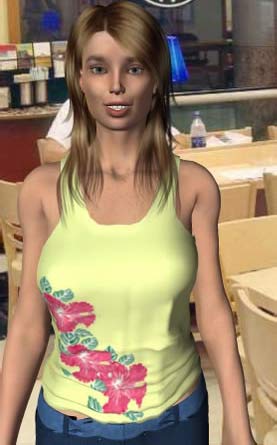Attractive Virtual Professors Draw Student Attention

There's a simple reason why computers have not taken over teachers' jobs: They're boring, unpersuasive, unattractive and soulless.
That may soon change if Amy Baylor can perfect the virtual professors she's working on.
"Up until now, the personal computer's potential to be a valuable teaching and learning tool has been stymied by its 'soulless' nature," says Baylor, a professor of instructional systems at Florida State University's Research of Innovative Technologies for Learning (RITL). "We're using computers to simulate human beings in a controlled manner so we can investigate how they affect and persuade people."
Baylor is focusing on friendly facial expressions, soothing hand gestures, and a "coolly intelligent voice" to create characters that are " both disarmingly lifelike and surprisingly persuasive."
Early tests show Baylor might be on to something.
The characters -- Baylor calls them pedagogical agents -- will ultimately be more than just 3-D animations and voices. Software will allow them to adapt to a student's skill level in a given subject and provide feedback, both cognitive and emotional.
The sorts of teachers that might be generated are endless and intriguing.
Sign up for the Live Science daily newsletter now
Get the world’s most fascinating discoveries delivered straight to your inbox.
"Unlike a human mentor, we can control all aspects of a pedagogical agent — its gender, age, ethnicity, personality, message, and interaction style — to represent the ideal persona for facilitating learning," Baylor says. "This leads to all kinds of exciting possibilities for simulating and researching different teaching styles and instructional strategies."
In a study funded by the National Science Foundation, Baylor employed non-stereotypical, virtual engineering mentors to challenge young women's stereotypes about the engineering profession.
Baylor had 79 female students rate a series of pedagogical agents on which were most like themselves, most like an engineer, and which they'd prefer to have as a professor. The agents were identical except for age, gender, attractiveness, and coolness (differing clothes and hair styles).
"As anticipated, when the young women in the current study were asked to select the agents who were most like them and who they most wanted to be like, they tended to pick young, female, attractive, and cool agents," Baylor writes in a recent report.
"However, they also selected the young, female, cool agents as being least like an engineer," the study found. "When asked to select who they would most like to learn from about engineering, the women in the current study were far more likely to pick male agents who were uncool but attractive. Interestingly, it was also the male, uncool agents that they tended to rate as most like an engineer."
While the test was brief, the effects seemed to be somewhat lasting.
The women in the study reported more positive math- and science-related beliefs compared to their attitudes at the beginning of the semester when the test was administered and also compared to a group of women who did not interact with an agent.
Baylor says further tests are needed in which the agents are assigned to students, rather than selected.
Animated demonstrations of the agents can be seen here.
- Vote for Your Favorite Real Robot
- New Robot Looks Strikingly Human
- New Sphere of Virtual Reality
- Gallery: Cutting-Edge Robots
Robert is an independent health and science journalist and writer based in Phoenix, Arizona. He is a former editor-in-chief of Live Science with over 20 years of experience as a reporter and editor. He has worked on websites such as Space.com and Tom's Guide, and is a contributor on Medium, covering how we age and how to optimize the mind and body through time. He has a journalism degree from Humboldt State University in California.










